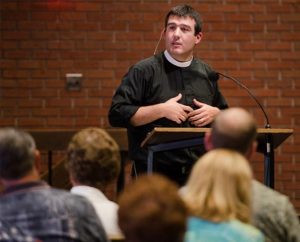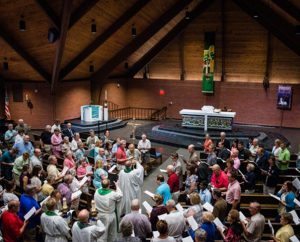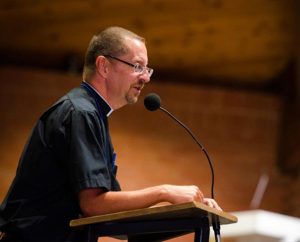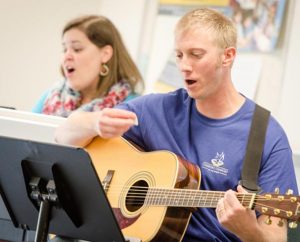By Roger Drinnon
Attendees who enjoyed this year’s Institute on Liturgy, Preaching and Church Music at Concordia University, Nebraska July 28-31 likely were unaware that the event’s theme emerged from choosing a wrong door at The Lutheran Church—Missouri Synod’s International Center in St. Louis.

“Rev. Bryan Wolfmueller wandered into my office one day looking for the restroom next door,” said the Rev. William Weedon, LCMS director of Worship and International Center chaplain. “Then, in the course of catching up, he threw out the question: ‘Have you ever looked at what The Book of Concord has to say about the relationship between preaching and the conscience?’”
“I was at the [International Center] for a meeting, and I had been thinking about the conscience as the location of the Gospel’s comforting activity,” said Wolfmueller, who is pastor of Hope Lutheran Church in Aurora, Colo. “I mentioned this to Chaplain Weedon with a handful of quotations from the Lutheran Confessions, and we talked about it for a while.”
Wolfmueller’s question prompted Weedon to research all references to “conscience” in The Book of Concord.
“It was like blinders falling off my eyes — I had never noticed how significant this was before,” said Weedon. “In the minds of the reformers, the single greatest task of preaching is to bring the comfort of Christ to bear on consciences that are terrified by knowing that they have not and cannot fulfill what God in the law demands, and that only the comfort of Christ’s finished work, delivered securely through the means of grace, can accomplish this.”
Weedon said that Wolfmueller’s turning into the wrong room was a turning point in planning this year’s worship conference theme – “Comfort, Comfort Ye My People: Praying, Preaching and Singing the Comfort of Christ to the Troubled Conscience and the Broken Heart,” referencing the well-known Advent hymn (Lutheran Service Book, 347).
Emphasis on revitalization
In addition to the theme of comforting the conscience, the event also emphasized revitalization of congregations. Weedon said emphasis was placed on the synergy between pastor, liturgist and church musicians, whose gifts complement each other as they work together to bring the comfort of Christ during worship.

“We had a focus of our people having an experience of the Gospel that was so rich and so full and so practical, that they can take it back and share with their congregation and their various ministries,” he said.
Weedon also noted the importance of music in worship as a focus area for the conference, while citing the following Scripture verses as underscoring the role of music in worship:
- “Let the Word of Christ dwell in you richly, teaching and admonishing one another in all wisdom, singing psalms and hymns and spiritual songs, with thankfulness in your hearts to God (Col. 3:16).”
- “Be filled with the Spirit, addressing one another in psalms and hymns and spiritual songs, singing and making melody to the Lord with your heart (Eph. 5:18).”
“Getting the idea across to musicians that they are preachers of the Word – just as a pastor is a preacher of the Word — was an important part of this experience,” said Weedon. “The crown jewel of the conference was the hymn festival held at St. John Lutheran Church in Seward.”

More than 400 church musicians, pastors and laypeople attended the conference, which featured nearly 60 speakers providing presentations, seminars and workshops on a variety of topics. Plenary sessions included “Liturgy and Conscience: Our Earthly Reception of Heavenly Gifts” with Dr. John W. Kleinig, professor emeritus at the Australian Lutheran College; “Drawing Lines? Choosing Sides? Speaking the Truth in Love?” with Paul Soulek and Betsy Werner of St. John Lutheran Church and School, Seward, Neb.; and “After the Gospel the Whole Congregation Sings: Reformation Church Music” with Dr. Robin A. Leaver, professor emeritus of sacred music at Westminster Choir College, Princeton, N.J.
A “Preaching in the Conscience” session, featuring Wolfmueller, reinforced the messages of Christ’s comfort and forgiveness of sins from a Lutheran perspective.
“Comfort for terrified consciences — this is what the Scriptures are driving toward – that we would know the comfort of the death of Jesus for us,” said Wolfmueller. “This comfort is, then, what Lutheran teaching, Lutheran worship and Lutheran preaching deliver to us.”
Survey says: appreciation
Comments from the anonymous post-conference survey confirmed attendees’ appreciation for the event. Responses from attendees included:

- “The preaching was very good. I appreciated the use of a variety of liturgies. Simply being able to be a part of a large congregation worshiping and singing was a treat.”
- “A real joy to celebrate the Sacrament together and to receive individual absolution at the Service of Corporate Confession … wonderful music with our magnificent worship forms.”
- “I appreciated the wealth of the Lord’s gifts in all who sang, played, and preached. There was great respect for the received Lutheran heritage of worship … Worship was reverent, especially by the liturgists.”
- “I was refreshed by the worship and equipped by the presentations — all for further service in Christ’s Church.”
About 81 percent of attendees rated the conference as “very good,” with some 17 percent rating it as “good,” totaling 98 percent of attendees rating the conference between good and very good, according to the survey.
The conference was presented by LCMS Worship, a ministry of The Lutheran Church—Missouri Synod.
Roger Drinnon is manager of Editorial Services for LCMS Communications.
Posted Aug. 14, 2014 / Updated Sept. 3, 2014




